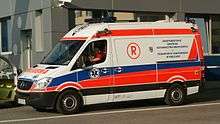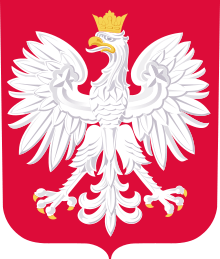Health care in Poland

Health care in Poland is free and is delivered through a publicly funded health care system called the National Health Fund (in Polish: Narodowy Fundusz Zdrowia), which is free for all the citizens of Poland provided they fall into the "insured" category (usually meaning that they have their health insurance paid for by their employer, or are the spouse or child of an insured person). According to Article 68 of the Polish Constitution everyone has a right to have access to health care. Citizens are granted equal access to the publicly funded healthcare system. In particular, the government is obliged to provide free health care to young children, pregnant women, disabled people and to the elderly.[1] However, private healthcare use is very extensive in Poland. Patients who are uninsured have to pay the full cost of medical services. According to study conducted by CBOS in 2016, out of 84% patients taking part in survey, 40% declare to use both private and public health services, 37% use only public health care and 7% use only private health services. 77% of all responders declare using of private health care is caused by long awaiting for public health care services.[2]
Financing and health expenses
The main financing source is health insurience in the National Health Fund. Citizens are obligated to pay insurience fee (redistributed tax) which is 9% deducted from personal income (7,75% is deducted from the tax, 1,25% covered by insured goes directly to the National Health Fund). National budget covers around 5% of all health care expenses. Since 2007 emergency rescue services are financed in total from national budged. Total health expenses in Poland are covered in 70% by health insurience in the National Health Fund, where the remaining 30% comes from private healthcare [3]
Structure
Structure of health system in Poland is regulated in following acts:[4][5][6]
| Legislation | Act no |
|---|---|
| The Act on Medical Activity (pol. Ustawa o działalności leczniczej) | Dz.U. z 2018 r. poz. 160 |
| The Act on Public Founding of Health Care Services (pol.Ustawa o świadczeniach opieki zdrowotnej finansowanych ze środków publicznych) | Dz.U. z 2018 r. poz. 1510 |
| The Act on Patients Rights and Patients Ombudsman (pol. Ustawa o prawach pacjenta i Rzeczniku Praw Pacjenta) | Dz.U. z 2017 r. poz. 1318 |
Stakeholders can be expressed in categories below:
- 1. Patient - receiver
- 2. Health care insurience institution (National Health Fund) – payer
- 3. Health service providers:
- Health care units functioning as economic operators
- Selfsufficient public health care units: research institutes, foundations, assiciatons and church.
- Private health care: medical, nursing, birthattendant, dentistry
- Drug stores
- 4. Control and supervising institutions:
- National Sanitary Inspection (pol. sanepid)
- National Pharmacological Inspection
- Patients Ombudsman
- Voivodship centres of public health
- Ministry of Health responsible for creating and executing nstional health programs, control and supervision on general healh situation
Access to health services
According to The Act 240 dated 27.08.2004 about Health Care Public Founding, access to health care services can be provided if patient is able to confirm having health insurance by presenting document like:[7]
- Insurience card
- Insurience card for employee family members
- Pensionary card
The basis of health care system is primary care physician (first contact physician), who is most commonly specialist in family health. Primary care physician is responsible for conducting treatment and taking preventive actions for assigned patients. If sickness requires intervention of specialist, first contact doctor issues referral to hospital or other health care unit.
Referral is not needed in units specialised in:
- onkology
- ginecology
- psychiatry
- dentistry
- sexually transmitted diseases
Referral is required to get access to:
- hospital treatment
- recovery treatment
- rehabilitation
- chronic disease care
Referral is not required from:
- suffering from tuberculosis
- infected with HIV
- combatants, war invalids and repression victims
- blind civilians if they are victims of war
- privileged soldiers, veterans in case of treatment of injuries and infections during fullfiling duties outside country borders
- drugs and alcohol addicted
- taking medical examination for organ donation
Emergency medical services

Emergency Medical Services (Polish: Ratownictwo Medyczne, RM) in Poland are a service of public, pre-hospital emergency healthcare, including ambulance service, provided by the individual Polish cities and counties. These services are typically provided by the local, publicly operated hospital, and are generally funded by the government of Poland. In a number of cases, the hospitals contract these services to private operators. In addition to publicly funded services, there are a variety of private-for-profit ambulance services operating independently.
Clinical university hospitals in Poland
The following is a listing of the clinical and university hospitals in Poland:
- Collegium Medicum in Bydgoszcz of the Nicolaus Copernicus University
- Collegium Medicum of the Nicolaus Copernicus University in Ciechocinek
- Uzdrowiskowy Szpital Kliniczny, Ciechocinek
- Uniwersyteckie Centrum Kliniczne, Gdańsk
- Uniwersyteckie Centrum Medycyny Morskiej i Tropikalnej, Gdynia
- Centralny Szpital Kliniczny im. prof. Kornela Gibińskiego, Katowice
- Samodzielny Publiczny Szpital Kliniczny im. Andrzeja Mielęckiego, Katowice
- Samodzielny Publiczny Szpital Kliniczny nr 5 - Szpital okulistyczny, Katowice
- Górnośląskie Centrum Zdrowia Dziecka, Katowice
- Górnośląskie Centrum Medyczne, Katowice
- Wojskowy Szpital Kliniczny z Polikliniką, Kraków
- Medical University of Lublin in Lublin
- Wojskowy Szpital Kliniczny z Polikliniką, Lublin

- Centralny Szpital Kliniczny, Łódź
- Uniwersytecki Szpital Kliniczny nr 1 im. Norberta Barlickiego, Łódź
- Uniwersytecki Szpital Kliniczny nr 2 im. Wojskowej Akademii Medycznej, Łódź
- Uniwersytecki Szpital Kliniczny nr 3 im. dr Seweryna Sterlinga, Łódź
- Uniwersytecki Szpital Kliniczny nr 4 im. Marii Konopnickiej, Łódź
- Uniwersytecki Szpital Kliniczny nr 5 im. gen. dyw. Bolesława Szareckiego, Łódź
- Uniwersytecki Szpital Kliniczny nr 6 – Instytut Stomatologii, Łódź
- Medical Sciences Faculty of the University of Warmia and Mazury, Olsztyn
- Uniwersytecki Szpital Kliniczny, Olsztyn
- Centrum Medyczne Kształcenia Podyplomowego, Otwock
- Samodzielny Publiczny Szpital Kliniczny im. prof. Adama Grucy, Otwock
- Samodzielny Publiczny Szpital Kliniczny nr 1 im. prof. Tadeusza Sokołowskiego, Police (pronounced [pɔˈlʲit͡sɛ])
- Szpital Kliniczny Przemienienia Pańskiego, Poznań
- Szpital Kliniczny im. Heliodora Święcickiego, Poznań
- Ginekologiczno-Położniczy Szpital Kliniczny, Poznań
- Ortopedyczno-Rehabilitacyjny Szpital Kliniczny im. Wiktora Degi, Poznań
- Szpital Kliniczny im. Karola Jonschera, Poznań
- Specjalistyczny Szpital Kliniczny Uniwersytetu Medycznego, Poznań
- Centrum Medyczne Kształcenia Podyplomowego, Warsaw
- Samodzielny Publiczny Szpital Kliniczny im. prof. Witolda Orłowskiego, Warsaw
- Ministerstwo Spraw Wewnętrznych i Administracji, Warsaw
- Centralny Szpital Kliniczny Ministerstwa Spraw Wewnętrznych i Administracji, Warsaw
- Centralny Szpital Kliniczny Ministerstwa Obrony Narodowej, Warsaw

- Wojskowy Szpital Kliniczny z Polikliniką, Wrocław
- Uniwersytecki Szpital Ortopedyczno-Rehabilitacyjny, Zakopane
Selected public and other hospitals
- Specialist Hospital in Jasło
- Children's Clinical Hospital, Kraków
- Krakowski Szpital Specjalistyczny im. Jana Pawła II, Kraków
- University Hospital, Kraków
- Państwowy Szpital Kliniczny Nr4, Lublin
- University Hospital, Łódź
- Wojewódzki Szpital Zespolony, Nowy Sącz
- SPZOZ, Puławy
- The County Hospital, Sanok
- Carolina Medical Center in Warsaw
- Children’s Memorial Health Institute, Warsaw
- Wojewódzki Szpital Specjalistyczny Chorób Płuc, Zakopane
- Medicover Hospital, Warsaw
- Wojewódzki Szpital Podkarpacki im.Jana Pawa II w Krośnie, Krosno
- Szpital Św. Wojciecha Poznań
National Health Situation
According to National Health Situation Report 2016,[9] the main causes of death in Poland are:
- Cardiovascular diseases (45% of all deaths)
- Cancer (25,4% of all deaths)
- Other external reasons: suicide, communication injuries and falls (5,7% of all deaths)
National Health Situation Report 2016 points smoking, alcohol abuse and overweight/obesity as main factors contributing to years of life lost in DALY scale:
- smoking takes away 18,6 years of life from man and 7,9 years of life from woman;
- alcohol abuse is responsible for lost of 9,5 years of life for man and 1,7 years of life for woman. Average alcohol consumption is 10,7l per person/year, which is slightly higher than European average 10,2l;
- overweight and obesity is responsible for 9,6 years lost in general. The problem of overweigt and obesity exists among 62 – 68% of man and 46 – 60% of women.
Smoking itself causes lost of 13,1% life, where behavioral factors takes away 36% of life.
Problems in health system in Poland
Health care system in Poland is experiencing problems from many years. According to Euro Health Consumer Index 2016, Poland is on 31. Place out of 35.[10] Main problems listed in Health Consumer Index 2016 are:
- difficult access to specialist physician (especially to hospital treatment) and long time of waiting for health services: planned, serious surgery: more than 90 days, cancer treatment: more than 21 days, tomography: more than 7 days
- bad results in cancer treatment - no access to modern medicines and high level of mortality
- access to legal abortion - Poland, Malta, Cyprus and Ireland are the only countries in Europe with score "0" in Health Consumer Index 2016
- digital structure of health information: difficulties with electronic prescriptions and referrals, no access to examination results or list of authorised physicians
References
- ↑ "PolishConstitution". Polish Parliament. Retrieved 23 April 2013.
- ↑ https://www.cbos.pl/SPISKOM.POL/2016/K_112_16.PDF
- ↑ http://www.sdgs.pl/wp-content/uploads/2017/06/sytuacja-zdrowotna-ludnosci-w-polsce-2016-s.pdf
- ↑ http://prawo.sejm.gov.pl/isap.nsf/DocDetails.xsp?id=WDU20180000160
- ↑ http://prawo.sejm.gov.pl/isap.nsf/DocDetails.xsp?id=WDU20180001510
- ↑ http://prawo.sejm.gov.pl/isap.nsf/DocDetails.xsp?id=WDU20170001318
- ↑ http://www.nfz.gov.pl/dla-pacjenta/ubezpieczenia-w-nfz/
- ↑ Wojskowy Instytut Medyczny
- ↑ http://www.sdgs.pl/wp-content/uploads/2017/06/sytuacja-zdrowotna-ludnosci-w-polsce-2016-s.pdf
- ↑ https://piu.org.pl/wp-content/uploads/2017/07/Europejski-Konsumencki-Indeks-Zdrowia-2016.pdf
